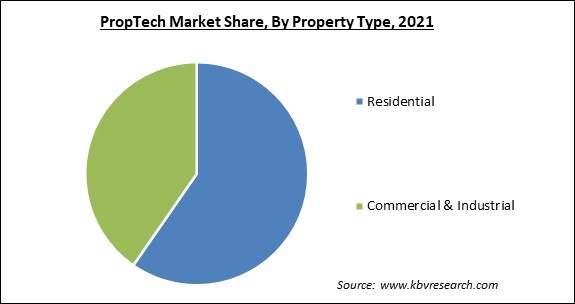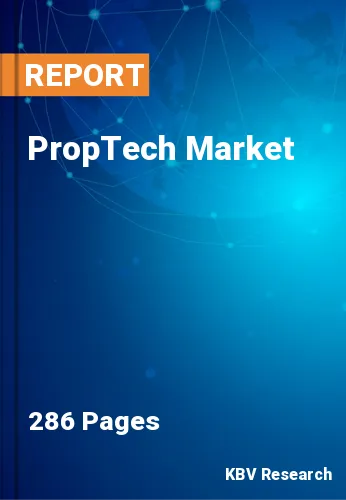The Global PropTech Market size is expected to reach $64.3 billion by 2028, rising at a market growth of 15.4% CAGR during the forecast period.
PropTech, also known as property technology, refers to the application of information technology (IT) to the management and purchase of the real estate by both people and businesses. PropTech leverages digital innovation to meet the demands of the real estate business, just as FinTech focuses on the use of technology in banking.

For players in all phases of the real estate industry, including buyers, sellers, brokers, lenders, and landlords, PropTech is meant to simplify and link procedures. Popular PropTech innovations include software for reporting maintenance, sharing rent payments, and crowdsourcing new real estate projects. Virtual reality software enables website users to visually walk around their homes.
Although it is still a young industry, PropTech is being advanced by the cloud, digital transformation, and technology convergence. PropTech seeks to streamline property administration, increase efficiency, and save costs and time spent on real estate transactions, among other objectives. The distributed ledger technology termed the Blockchain is predicted to contribute to the development of a secure infrastructure for smart contracts, tenant credit checks, and real estate payments.
The Proptech Market has suffered because of the COVID-19 pandemic involving industries. Due to the lockdown and societal conventions of distance, major corporations have temporarily ceased operations in many regions. Health issues, orders to remain at home, and economic uncertainty all contributed to a notable decline in house sales in several urban areas. The notion of working from home has hurt residential sales as well as companies who lease office space, in addition to having a negative effect on residential sales. Thus, it is anticipated that the PropTech Industry will quickly rebound despite the negative effects of the COVID-19 outbreak on the market.
As more and more gadgets and pieces of technology become linked, the Internet of Things (IoT) is now permeating a number of different businesses. There is no exception to this tendency in the real estate sector. Real estate IoT will make it simpler and more effective for all parties involved to acquire, sell, rent, and manage properties. The Internet of Things is a network of actual objects connected to the internet (IoT). Thermostats, TVs, lightbulbs, and refrigerators are all included. When it comes to real estate, there are opportunities to enhance the selling, purchasing, and management processes by automating different functions. The market for PropTech is predicted to expand as a consequence of the real estate sector's increasing embrace of IoT.
Urbanization has accelerated globally in recent years. The process of more people relocating to urban areas is known as urbanisation. The main cause of urbanisation is migration from rural to urban areas, which increases the size and populace of urban areas. These population changes have an impact on other aspects of land use, economic activity, and culture. Urbanization has historically been linked to important social and economic changes. For example, living in an urban region is linked to higher levels of education and literacy, better health, lower fertility, a longer life expectancy, easier access to social services, and expanded opportunities for political and cultural involvement. Therefore, the adoption of smart home automation technology would expand dramatically as a result of this component.
To allow its systems to be specifically designed to best suit the lifestyle of its residents, a smart home market assists in collecting information on energy use and bills, movements, purchases, and music preferences, among other things. Smart home devices could be susceptible to simple hacking techniques. Since information about people's identities, physical safety, health care, and houses is electronically kept in the cloud, there is a considerable risk that hackers may utilise this information improperly. The expansion of the PropTech industry may be constrained throughout the projected period as a result of concerns about privacy and security breaches.
Based on property type, the PropTech market is classified into residential and, commercial & industrial. The commercial and industrial segment showcased the significant revenue share in the PropTech market in 2021. The segment's expansion is explained by the rising demand for office space and the global trend toward urbanization. In the last many years, there has been a noticeable increase in the usage of cutting-edge technology for property management in the commercial and industrial real estate industry.

Based on the solution, the PropTech market is divided into software and services. The services segment registered the prominent revenue share in the market in 2021. The desire for new rental practices, selling options, and new idea agents & landlord services, among other things, is what's being credited for the segment's rise. Professional and managed services are further broken down under the services area. The need for professional services in the real estate industry, such as consulting, advice, and portfolio analysis, is on the rise, which is the cause of the segment's development.
Based on deployment mode, the PropTech market is divided into on-premise and cloud. The cloud-based segment accounted for highest revenue share in 2021. The increasing acceptance of cloud deployment by a variety of end users, such as housing associations, property investors, property managers, and others, is credited with the segment's rise. Small, medium-sized, and large organizations are being encouraged to transition to cloud-based proptech solutions by benefits including ease of use, scalability, cost, and a decrease in tenant disputes.
Based on end-use, the PropTech Market is divided into Housing associations, property managers/agents, property investors, and others. In terms of revenue share, the housing association segment led the PropTech market in 2021. The difficulties townships and flats confront, such as collecting payments, carrying out upkeep, and keeping track of renters, are blamed for this expansion. The market's major participants have been compelled by all of these obstacles to provide solutions for payment tracking, inspections, and transparent and thorough reporting. Using proptech software, affordable housing helps allocate the right rent payments depending on how much the rent payer contributes over government funding.
| Report Attribute | Details |
|---|---|
| Market size value in 2021 | USD 24 Billion |
| Market size forecast in 2028 | USD 64.3 Billion |
| Base Year | 2021 |
| Historical Period | 2018 to 2020 |
| Forecast Period | 2022 to 2028 |
| Revenue Growth Rate | CAGR of 15.4% from 2022 to 2028 |
| Number of Pages | 286 |
| Number of Tables | 533 |
| Report coverage | Market Trends, Revenue Estimation and Forecast, Segmentation Analysis, Regional and Country Breakdown, Companies Strategic Developments, Company Profiling |
| Segments covered | Solution, Property Type, Deployment Type, End-user, Region |
| Country scope | US, Canada, Mexico, Germany, UK, France, Russia, Spain, Italy, China, Japan, India, South Korea, Singapore, Malaysia, Brazil, Argentina, UAE, Saudi Arabia, South Africa, Nigeria |
| Growth Drivers |
|
| Restraints |
|
Based on region, the PropTech market is classified into North America, Europe, Asia Pacific, and LAMEA. By contributing the largest revenue share to the PropTech market in 2021, North America led the market. The presence of well-known players in the area is credited with driving regional progress. One of the most reliable and promising businesses in North America, real estate is expanding. The area is regarded as a pioneer in embracing new technology. The region's tech-savvy millennial demographic is fueling an increase in demand for smart homes with IoT-enabled devices. In turn, this is accelerating market expansion in North America.
Free Valuable Insights: Global PropTech Market size to reach USD 64.3 Billion by 2028
The market research report covers the analysis of key stake holders of the market. Key companies profiled in the report include Altus Group Limited, Ascendix Technologies, Zumper, Inc., Opendoor technologies, Inc., Reggora, Inc., Guesty Inc., Holo Builder (FARO Technologies, Inc.), Zillow Group, Inc., ManageCasa, Inc., and Coadjute Limited.
By End-user
By Property Type
By Deployment Type
By Solution
By Geography
The global PropTech Market size is expected to reach $64.3 billion by 2028.
Increasing use of IOT in real estate are driving the market in coming years, however, Issues with privacy and security violations restraints the growth of the market.
Altus Group Limited, Ascendix Technologies, Zumper, Inc., Opendoor technologies, Inc., Reggora, Inc., Guesty Inc., Holo Builder (FARO Technologies, Inc.), Zillow Group, Inc., ManageCasa, Inc., and Coadjute Limited.
The expected CAGR of the PropTech Market is 15.4% from 2022 to 2028.
The Residential segment acquired maximum revenue share in the Global PropTech Market by Property Type in 2021 thereby, achieving a market value of $36.2 billion by 2028.
The North America market dominated the Global PropTech Market by Region in 2021, and would continue to be a dominant market till 2028; thereby, achieving a market value of $25.5 billion by 2028.
Our team of dedicated experts can provide you with attractive expansion opportunities for your business.

